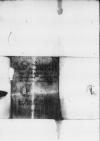Letter #431
Cornelis DE SCHEPPER to Ioannes DANTISCUSBrussels, 1529-06-25
English register:
De Schepper announces the arrival in Spain of Søren Nørby, who experienced the perfidy of the Grand Duke of Muscovy [Vasily III] as well as the magnanimity of the King of Poland [Sigismund I]. Despite his hostile military activities, Nørby was well received in Vilnius by the King, the Bishop of Płock [Andrzej Krzycki] and other [Polish dignitaries]. Dantiscus is invited to equal the gesture of his King, to receive Nørby as a friend and to give him his full support.
| received Piacenza, [1529]-10-02 Manuscript sources:
Auxiliary sources:
Prints:
| ||||||||||||
Text & apparatus & commentary Plain text Text & commentary Text & apparatus
Magnifico Domino
Apud sacram
Salutem.
Ecce, de quo toties mentionem fecimus, ad vos venit
Datum
Tuus ex animo frater et filius


 AAWO, AB, D.3, f. 27v
AAWO, AB, D.3, f. 27v